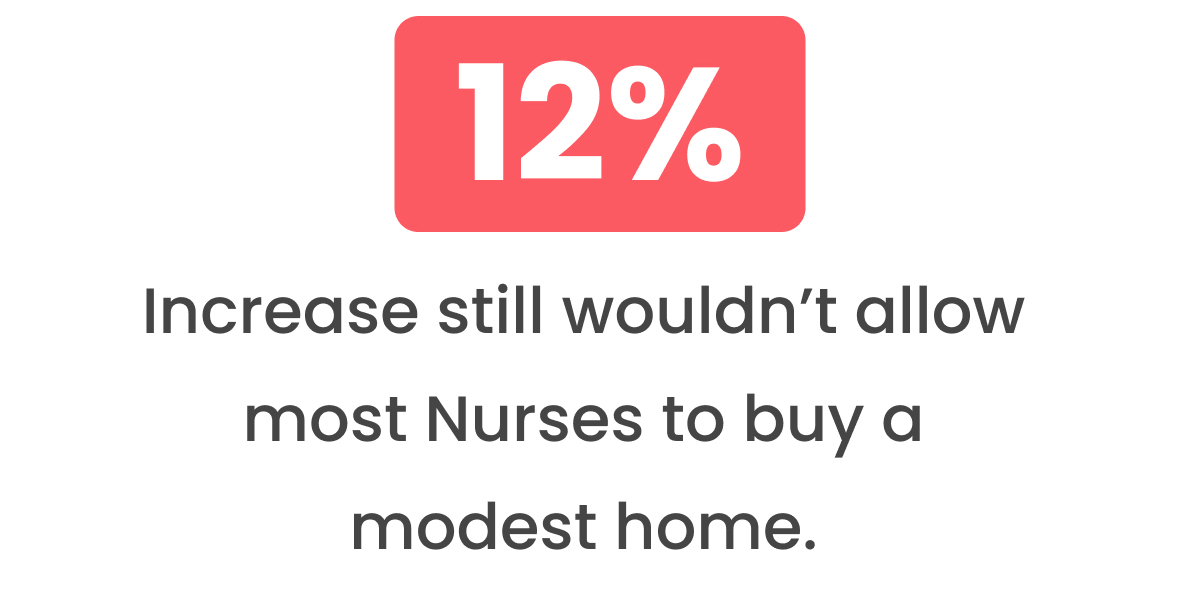- 15 April 2021
- 3 min read
Will Nurses Be Better Or Worse Off With A 1% Pay Rise?
Subscribe "even a 12.5% increase in pay still wouldn’t allow Nurses in many parts of the UK to purchase even a modest home"
"even a 12.5% increase in pay still wouldn’t allow Nurses in many parts of the UK to purchase even a modest home"What does the phrase 'Real Terms' mean and does a 1% pay rise mean Nurses are getting an above-inflation increase or not?
The government’s announcement of a proposed 1% pay rise for Nurses has been heavily criticised. And it isn’t hard to see why, given that some unions have suggested a 12.5% pay rise would be more appropriate.
Here’s what we do know about Nursing pay as it currently stands.
However, the entire debate about the pay rise is often being oversimplified and misunderstood, because of the issue of ‘real terms’.
Some argue 1% represents a real terms increase; others think it represents a real terms decrease.
But what does real terms actually mean?
And how important are cost of living variations in this debate?
Up Or Down?
Real terms is a phrase that helps to clarify the real value of the wages we earn.
In the context of Nurses’ wages, it takes into account how a Nurse’s costs influence the real value of earnings.
And here’s where the confusion begins.
Those who argue that a 1% increase represents a real terms increase refer to the fact that the current rate of inflation is 0.9%.
In their minds the calculation is simple: 1% is an above-inflation rise, and therefore a real terms increase.
Those who argue that a 1% increase means a real terms drop in pay look beyond current inflation.
They refer to issues like Brexit, and the inevitable post-pandemic slump.
Cost of living will likely go up as taxes and different costs rise – and so a 1% pay rise looks insufficient.
But in many ways, neither of these arguments are especially helpful.
And that’s because, as has been proved by a recent report, cost of living isn’t a consistent and easily measurable metric.
It varies enormously from one region to the next.

Nursing Salaries Fail To Compensate For Regional Variation
A study by the institute for Fiscal Studies assessed how regional variations in living costs impact Nurses.
Worryingly, it found that a higher cost of living leads to an increased exit rate from the NHS.
And it found that living costs vary enormously across the UK.
One of its main proof points was that the average house price across the UK ranges from 2.5 times to 14 times nursing salaries.
Put simply, an NHS Nurse can live comfortably on a starting salary in some regions, while in others even an above-average salary simply isn’t good enough.
Importantly, the report also noted that although trusts have some freedom to top up salaries in reaction to these variations, that flexibility simply didn’t go far enough.








About this contributor
Nurses.co.uk Founder
I launched Nurses.co.uk (and subsequently Socialcare.co.uk, Healthjobs.co.uk and Healthcarejobs.ie) in 2008. 500 applications are made every day via our jobs boards, helping to connect hiring organisations recruiting for clinical, medical, care and support roles with specialist jobseekers. Our articles, often created by our own audience, shine a light on the career pathways in healthcare, and give a platform to ideas and opinions around their work and jobs.
More by this contributorWant to get involved in the discussion?
Log In Subscribe to comment